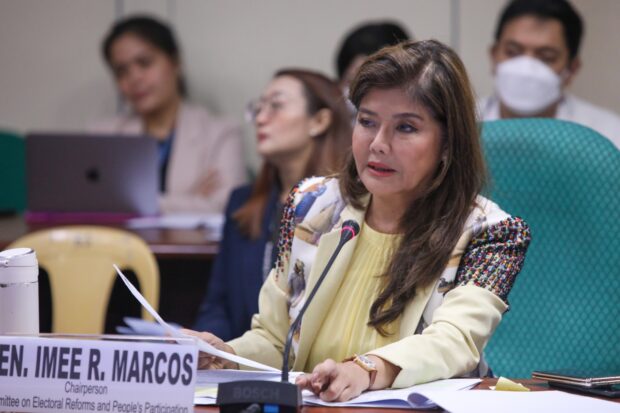
Sen. Imee R. Marcos emphasizes the importance of defining the party-list system as she presides over the Committee on Electoral Reforms and People’s Participation’s public hearing on several proposed measures related to election laws. During Monday’s hearing, Aug. 7, 2023, (Photo from the Senate Public Relations and Information Bureau)
MANILA, Philippines — Senators are studying a number of changes to the current system of party-list representation in the House of Representatives, as they lamented how it has been overrun by members of political dynasties and millionaires.
At the hearing of the Senate Committee on Electoral Reforms and People’s Participation, Sen. Imee Marcos is also pushing for an amendment to the current law to prevent a wholesale substitution of party-list nominees, which has raised suspicion that the system has been subjected to horse-trading.
“The definition of the party list system has become difficult to put together and understand. We have heard nasty observations that this party list system is for sale and this has been a recurring problem because it is somehow true,” she said.
“Senators appear as beggars when compared to some party-list lawmakers,” Marcos added.
Marcos made the remark as her committee tackled several bills that seek to amend Republic Act No. 7941, or the Party List Law.
‘Backdoor entry’
Senate Bills No. 201 and 1174, filed by Sen. Ronald Dela Rosa and Marcos, respectively, seek to disqualify outright party-list groups that are supposedly involved in criminal activities and advocacies such as the overthrow of the government.
Marcos said senators were also looking at limiting the entry of party-list groups to only those that need representation as marginalized sectors, noting how the system has become a “backdoor entry” for millionaires and members of political dynasties.
“How do we bring these abuses to an end finally?” she asked Commission on Elections (Comelec) officials led by chairperson George Erwin Garcia.
According to Garcia, the House of Representatives currently has 69 members from 66 party-list groups.
Among the proposals being considered, Marcos said, was providing the Comelec with longer periods within which to verify the existence and track record of party-list groups that are up for accreditation, as well as the prohibition against groups from making substitutions of their nominees after elections.
She also cited a bill filed in the House of Representatives by the progressive Makabayan bloc, which disqualifies relatives of incumbent government officials, as well as former police and military officials.
Voting in malls
Meanwhile, at least 10 barangays in Metro Manila, Cebu City, and Legazpi City will conduct their pilot testing for mall voting in the Oct. 30 barangay and Sangguniang Kabataan elections.
The Comelec on Monday formally entered into an agreement with the SM and Robinsons shopping mall chains for the trial of mall voting.
Around 300,000 registered voters in the 10 pilot barangays will get to vote in polling precincts set up inside the malls instead of the usual public schools.
The shopping mall chains will shoulder the logistical requirements, according to the Comelec chairperson.
“We want to make the voting process easier especially for the elderly, persons with disability, and pregnant women,” he said.
Garcia said that should the pilot test be successful, mall voting will be implemented nationwide by the 2025 midterm elections.
The participating malls are SM Manila for Barangay 659 in Manila’s 5th district; SM Sucat for Barangay San Dionisio, Parañaque City 1st district; SM North Edsa for Barangay Alicia, Quezon City 1st district; SM Legazpi for Barangay 36 Kapantawan, Legazpi City; and SM Consolacion Cebu for Barangay Pitogo in Consolacion, Cebu;
Robinsons Magnolia for Barangay Horseshoe, Quezon City 4th District; Robinsons Las Piñas for Barangay Talon Tres, Las Piñas City; Robinsons Ermita for Barangay 668, Manila 5th District; Robinsons Metro East for Barangay Dela Paz, Pasig City 2nd district; and Robinsons Cebu for Barangay Parian, Cebu City.
Simulation exercises will be held on Aug. 19 in SM Manila, SM Legazpi, Robinsons Ermita, and Robinsons Cebu.

